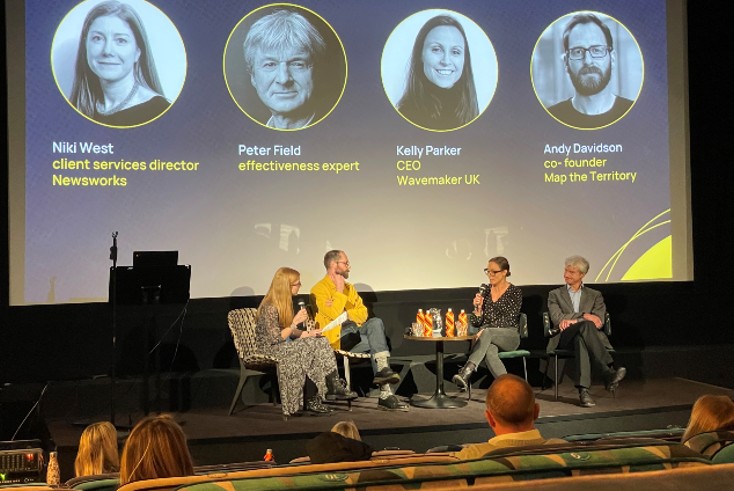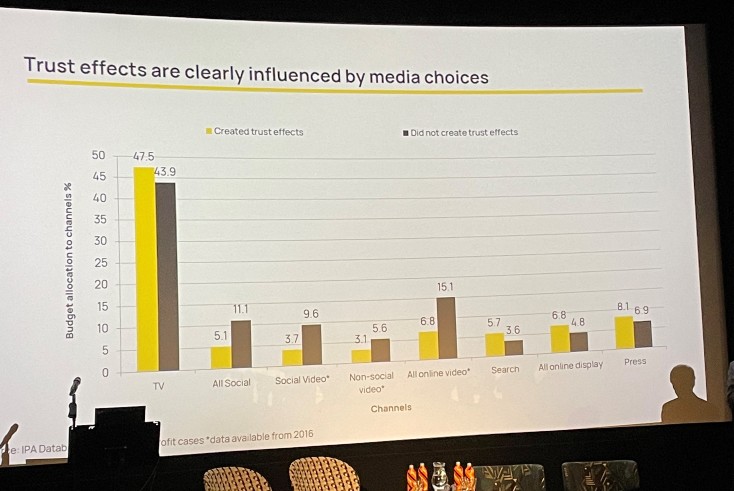Don’t write trust in media off as ‘wokery’, warns Peter Field

“Trust shouldn’t be written off as some kind of ‘wokery.'”
Effectiveness expert Peter Field delivered that warning within a strong business case for brands to invest in consumer trust at a conference held by newsbrands marketing body Newsworks today.
Calling the issue of trust in brands a relatively “novel” development among consumers, Field warned that brands should take the metric seriously and not dismiss it as a political issue, but rather a legitimate business concern.
Most brands have pivoted to a more defensive posture during recent economic downturns that deemphasises trust, according to IPA data presented by Field.
But compared to data from 2000-2012, IPA survey data from 2014-2022 found that trust had jumped from the seventh-highest brand metric linked to profit to the second-highest metric, just below quality.
Field emphasised that buying ads on newsbrands is associated with greater ad effectiveness and brand uplift. The upshot, Field argued, is that, if trust is indeed an important metric for brands, advertising in a trusted medium like on a newsbrand’s website or print issue is a media strategy that will pay dividends, especially as part of a multimedia campaign strategy.
“To build a brand, the environment that that brand is showing up in is incredibly important,” said Wavemaker UK CEO Kelly Parker, who spoke on a panel at the event.
To that end, newsbrands have provided increasingly trusted environments to advertise, according to data presented by Field. He described that there has been a “quantum leap” in trust uplifts provided by advertising in newsbrands’ print and digital offerings since 2016, a development he attributed to a loss of trust in other comparable forms of media, such as social media, following the 2016 Brexit campaign and Cambridge Analytica scandal.
Meanwhile, other media environments may instead decrease trust perceptions for brands. While Field hedged that he could not yet draw direct conclusions, he did suggest that “some media channels do create trust. Some media channels hinder trust.”

In particular, social video was pointed out as a low-trust environment to advertise. The most popular social video platform, TikTok, has come under intense scrutiny by western governments this week over concerns relating to national security. Though such anxieties have been bubbling for months, the today the UK Government moved to ban the platform from devices used by officials. The US and the European Commission did the same earlier this month, and this week the Biden administration called on TikTok to sell its US business.
Such bans could further spook consumers and brands over the trust in social video, though it is worth noting they were not considered mediums that largely created trust effects anyway, according to the data presented by Field.
On the panel, Andy Davidson, co-founder of consumer research studio Map the Territory, which conducted studies of the British public’s perceptions of trust, added that digital advertising needs to be done carefully in order for trust effects to be felt by consumers across various platforms.
“It seems that that programmatic, cookie-driven advertising—those ads that follow you around every site you go to—is eroding the ability for the context to confer trust on those ads,” he said. “Because people realise: This is appearing to me because of something I’ve done, not because of something to do with this site. So that kind of native advertising that feels like it’s much more in keeping and in-tune with the environment in which its placed allows you to get those effects.”
A blueprint for understanding trust in media
Davidson also advised the crowd that many current definitions and measurements for consumer trust in media and brands are flawed and need to be reconsidered. In a study presented by Davidson and Tapestry Research managing director Ian Wright, the duo sought to rebuild our understanding of trust.
Based on their qualitative research, they identified four building blocks of what causes consumers to trust or distrust media and brands: familiarity, fame, competence, and risk.
Familiarity and fame were both understood to boost brand perceptions; that is, having more knowledge of, and positive brand association with, brands leads consumers to be more trustworthy of them. On the other hand, competence and perceived risk could be a drag on brands, as brands that are well-known but not considered competent, or brands that tell stories related to material that requires accuracy or else a personal harm be incurred by the consumer (e.g., information on the latest strain of coronavirus) could suffer a lack of trust, especially if news reporting is found to be inaccurate.
Surveying the British public, the pair found that brands on average received a 50% uplift in trust when they advertised on a newsbrand, as there was a sense among respondents that a brand is perceived as more competent and less risky when associated with a newsbrand.
Full findings from the survey are expected to be released by Newsworks in April.



